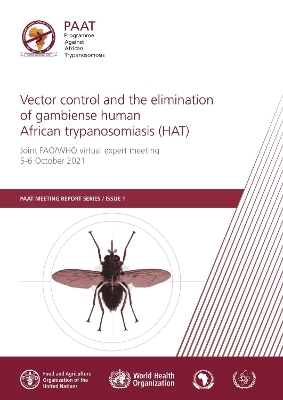
Vector control and the elimination of gambiense human African trypanosomiasis (HAT)
Joint FAO/WHO virtual expert meeting5-6 October 2021
Seiten
2022
Food & Agriculture Organization of the United Nations (FAO) (Verlag)
978-92-5-136250-1 (ISBN)
Food & Agriculture Organization of the United Nations (FAO) (Verlag)
978-92-5-136250-1 (ISBN)
Human African trypanosomiasis (HAT) is a vector-borne parasitic disease transmitted by tsetse flies in sub-Saharan Africa. The meeting reviewed tsetse control tools and found that vector control contributes to decreasing gambiense human African trypanosomiasis transmission by reducing tsetse-human contact.
Human African trypanosomiasis (HAT) is a vector-borne parasitic disease transmitted by tsetse flies in sub-Saharan Africa. The gambiense form of the disease (gHAT) is endemic in western and central Africa and is responsible for more than 95 percent of the HAT cases reported annually. In the road map for neglected tropical diseases 2021-2030, WHO targeted gHAT for elimination of transmission by 2030. FAO supports this goal within the framework of the Programme against African Trypanosomosis (PAAT).In the framework of the WHO network for HAT elimination, FAO and WHO convened a virtual expert meeting to review vector control in the context of gHAT elimination. The experts included health officials from endemic countries and representatives from research and academic institutions, international organizations and the private sector. Seven endemic countries provided reports on recent and ongoing vector control interventions against gHAT at national level (i.e. Angola, Cameroon, Cãte d'Ivoire, Chad, Democratic Republic of the Congo, Guinea and Uganda). The country reports were followed by thematic sessions on various aspects of vector control: tools, costs, community-based approaches, monitoring and reporting. Tsetse control was also discussed in the broader framework of One Health, and in particular in relation to the control of animal trypanosomosis. This report presents a summary of the findings and lessons learned
Human African trypanosomiasis (HAT) is a vector-borne parasitic disease transmitted by tsetse flies in sub-Saharan Africa. The gambiense form of the disease (gHAT) is endemic in western and central Africa and is responsible for more than 95 percent of the HAT cases reported annually. In the road map for neglected tropical diseases 2021-2030, WHO targeted gHAT for elimination of transmission by 2030. FAO supports this goal within the framework of the Programme against African Trypanosomosis (PAAT).In the framework of the WHO network for HAT elimination, FAO and WHO convened a virtual expert meeting to review vector control in the context of gHAT elimination. The experts included health officials from endemic countries and representatives from research and academic institutions, international organizations and the private sector. Seven endemic countries provided reports on recent and ongoing vector control interventions against gHAT at national level (i.e. Angola, Cameroon, Cãte d'Ivoire, Chad, Democratic Republic of the Congo, Guinea and Uganda). The country reports were followed by thematic sessions on various aspects of vector control: tools, costs, community-based approaches, monitoring and reporting. Tsetse control was also discussed in the broader framework of One Health, and in particular in relation to the control of animal trypanosomosis. This report presents a summary of the findings and lessons learned
| Erscheinungsdatum | 11.07.2023 |
|---|---|
| Reihe/Serie | PAAT meeting report series |
| Zusatzinfo | col. figs |
| Verlagsort | Rome |
| Sprache | englisch |
| Themenwelt | Medizin / Pharmazie ► Medizinische Fachgebiete ► Arbeits- / Sozial- / Umweltmedizin |
| Medizin / Pharmazie ► Medizinische Fachgebiete ► Mikrobiologie / Infektologie / Reisemedizin | |
| Studium ► Querschnittsbereiche ► Epidemiologie / Med. Biometrie | |
| Weitere Fachgebiete ► Land- / Forstwirtschaft / Fischerei | |
| ISBN-10 | 92-5-136250-5 / 9251362505 |
| ISBN-13 | 978-92-5-136250-1 / 9789251362501 |
| Zustand | Neuware |
| Haben Sie eine Frage zum Produkt? |
Mehr entdecken
aus dem Bereich
aus dem Bereich
ein überfälliges Gespräch zu einer Pandemie, die nicht die letzte …
Buch | Hardcover (2024)
Ullstein Buchverlage
24,99 €


